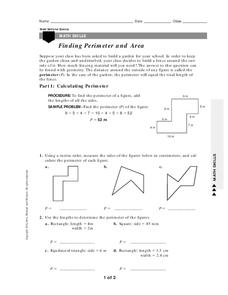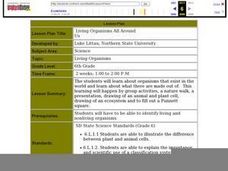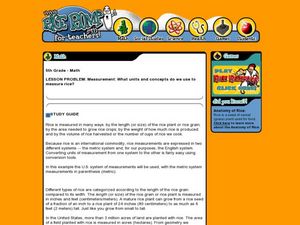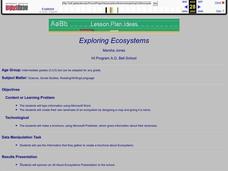Teach Engineering
Don't Be a Square
If Parseltongue is a genetic trait, what is the probability a wizard will inherit the ability to speak Parseltongue? Scholars investigate magical and biological genetics with Punnett squares.
Alabama Learning Exchange
How Big Can a Bee Be?
Mathematicians analyze the relationships between surface area and volume. They conduct Internet research, conduct various experiments, record the data in a spreadsheet, and graph the results and compare the rate of increase of surface...
Curated OER
Finding Perimeter and Area
In this area and perimeter worksheet, students are given the equations to find the perimeter and area of objects. They practice finding the perimeter by measuring the sides of given objects and adding them together. They find the area of...
Curated OER
Unit Conversions-Energy, Power, Flux
In this unit conversion worksheet, students solve 4 problems given a list of conversion factors for units of energy, power and flux.
Curated OER
Living Organisms All Around Us
Sixth graders study organisms that exist in the world and what they are made up of. They participate in a nature walk, a presentation, a drawing of an animal and plant cell, draw a ecosystem, and fill out a Punnett square.
University of Wisconsin
Sizing a Rain Garden
Most appropriate if you are applying the entire unit to build a rain garden at your school, this installment involves calculating the area that will drain into it. Your garden planners will need data from previous lessons, so this one...
Core Knowledge Foundation
Genetics and the Master Race
How did the beginnings of genetic research influence the Nazi party? A thorough, engaging unit incorporates the work of Gregor Mendel, the study of inherited traits, and the use of racism and discrimination during the Holocaust.
Exploratorium
Tired Weight
You don't need a scale to determine weight. This activity provides a way to use the concepts of air pressure and surface area to determine the weight of a vehicle by calculating the amount of weight each tire supports.
Curated OER
Area & Perimeter
Students define area and perimeter. They demonstrate understanding of the concepts concretely, with manipulatives, and describe with words, their strategies and thought processes.
Curated OER
Science Crossword Puzzle
Class members read 25 clues about all areas of science, including biology, chemistry, weather, physical science, and insert their answers into a crossword puzzle. There is no word bank and the students would need experience with tough...
Curated OER
What units and concepts do we use to measure rice?
Fifth graders look at different ways to measure rice. In this rice measurement lesson, 5th graders see the metric and customary measurements. They discuss how rice is measured by length, area of the field, weight, volume and yield.
Curated OER
Math in Science-The Pressure is On
In this pressure worksheet, students find the pressure of objects using the equation for pressure. They find the pressure of air in the atmosphere and the pressure of water in the ocean at different depths.
Curated OER
Pigs: Facts And Fun
Students complete a unit on pigs. They take a field trip to the fair and zoo, watch the video of "Charlotte's Web," create a poster, read and analyze "The Three Little Pigs," write a storybook, participate in a reader's theater, and make...
Curated OER
Mangrove Loss Faster than Land-Based Forests
Students explore the reasons Mangrove forests are in jeopardy. In this lesson, students read an article that discusses specific facts on Mangrove forests, then complete numerous activities that reinforce the information, such as taking...
NOAA
What's New?
Biodiversity in some areas is more diverse than one might think. Using a two-day lesson plan, pupils consider the biodiversity of the Hudson Canyon and the characteristics of one organism. They begin with an analysis of the common...
Curated OER
Grid Frame Mapping
Students map and describe small area of the schoolyard and discuss habitats.
Teach Engineering
Air Pressure
Investigate what is pushing on us. An intriguing activity has pupils calculate the amount of force on various squares due to air pressure. Using the data, individuals create a graph in the third activity of the Up, Up and Away unit...
National Geographic
Australia, Antarctica, and Oceana
Go on a traveling adventure throughout Australia, Oceana, and Antarctica! This textbook excerpt offers a full unit of study that can easily be supplemented by extra projects or research materials. Learners study maps, read about native...
Curated OER
Metric Conversions Worksheet
In this metric activity, students examine conversion factors for length, mass, volume and area. Definitions of prefixes and metric abbreviations are identified.
Curated OER
Exploring Ecosystems
Students examine the characteristics of an ecosystem. They create their own landmass of an ecosystem and creating a map of the area. They develop a brochure sharing information about their new landmass.
Curated OER
The Apollo-11 Landing Area at High-Resolution
In this moon crater worksheet, students use images of craters taken from the Lunar Reconnaissance Orbiter to determine the size of the craters. This worksheet has 6 problems to solve.
Curated OER
Development of Industrial New Hampshire
Students work in groups to research and share information about several different topics that were part of the development of Industrial New Hampshire. Students complete five parts of the project which include researching, role playing...
Curated OER
Counting Craters on the Hubble Space Telescope!
In this Hubble Space Telescope worksheet, learners are given a photograph of the radiator recovered after being in space on the Hubble Space Telescope since 1993. Students solve 6 problems about the impacts that left craters on the...
Curated OER
Working with Rates
In this working with rates worksheet, students solve 9 problems where they find the rates, they solve 5 problems where they find the rates for compound units and they solve 5 problems where they find the rates using scientific notation.

























